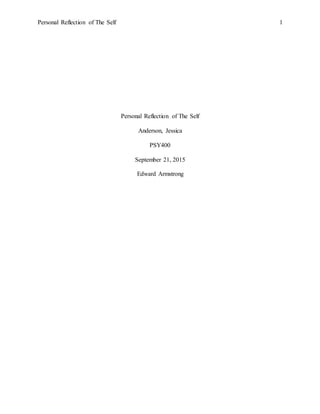
Personal Reflection of The Self
- 1. Personal Reflection of The Self 1 Personal Reflection of The Self Anderson, Jessica PSY400 September 21, 2015 Edward Armstrong
- 2. 2 Personal Reflection of The Self This paper will define the concept of self in the social world. Furthermore, it will apply the self to life including self-esteem, self-concept, and self-efficacy to an individual. Lastly, it will describe at least two social experiences that effected an individual’s personal development. Defining the concept of self in the world consists of three major components recognized as identity, social relationships, and multiple selves. Understanding one’s self concept in the world means recognizing their identity. Generally in one’s analysis of the self, self-schemas are developed.” Beliefs about self that organize and guide the processing of self-relevant information” (Myers, 2010, p.38). In other words, “Who am I?” In asking this question there is a desire to gain self-understanding or learning about the self through processes such as introspection which looks “ inwardly to assess and understand why we do what we do” (Baron & Branscombe, 2012, p.113). In assessing inwardly through introspection individuals often seek outside insight of the self. “Self-knowledge is sought through two primary methods: introspection and considering ourselves from others’ vantage point” (Baron & Branscombe, 2012, p.135) . In the social world, it is evident that individuals will consider themselves through the eyes of others, additionally through the social relationships formed with other individuals. The social relationships interactions and dynamics are a direct impact of the concept of the self in the social world. “Social relationships help define our self. How we think of ourselves is linked to the person we’re with at the moment” (Myers, 2010, p.38). In a social setting individuals tend to play the role in which the social setting will determine the roles that individuals play. The dynamics of social settings and relationships can consist of formal and informal interaction such as the work relationships and familial relationships. ”Self-concept includes multiple selves. Some of your selves are linked to the roles you play and the
- 3. 3 relationships you have” (Kenrick, Neuberg, & Cialdini, 2010, p.50). The multiple selves individuals discover during social settings reveal personal behaviors and attitudes. In the application of the self to life including self-concept, self-efficacy, and self- esteem one is able to further observe behaviors and attitudes. Self-esteem deals with ones attitudes toward themselves which can be either negative or positive. One with a positive outlook of the self will have a high self-esteem where as one with a negative outlook of the self exhibits a low self-esteem. In the social world where social status plays a major role concerning the self, with a social advantage or disadvantage self-esteem is directly impacted by such occurrences. “Research indicates that many socially disadvantaged groups do have, on average, somewhat lower self-esteem than groups that are socially advantaged. To the extent that self-esteem reflects how we believe others appraise us, high self-esteem can be difficult to achieve for those who are excluded from valued social roles” (Baron & Branscombe, 2012, p.126). In a social institution such a school where education of social roles throughout history is taught an individual will begin to find self-efficacy or self-worth most crucial to their existence. Furthermore, a sense of self-concept is developed in the process. It is safe to assume that in a social educational institution, that if the social role of a group that an individual identifies themselves with is depicted in a negative light or shown that there was little role played in society the individual will begin to develop the concept of the self in a negative light as well. As stated previously exclusion of individuals in valuable social roles can lead to difficulty of self-esteem, furthermore self-efficacy and self-concept. In addition to the self in the world, social experiences affect personal development. During the span of human development social experiences have long lasting impacts on the life, especially those which occur during childhood. ” Healthy social and emotional skills can reduce
- 4. 4 the chances of risky behaviors and prepare your child for the challenges of life” (Bolling, 2015). In contrast, unhealthy social experiences increase the chances of risky behaviors and can possibly result in the child being unprepared for challenges of life. In an instance where a child is bullied or singled out for cultural differences in a social setting, it can have a long-term detrimental effect on the development of the self. Experiences such as bullying are cause for introspection and mending of self-efficacy. “These cognitive self-evaluations influence all manner of human experience, including the goals for which people strive, the amount of energy expended toward goal achievement, and likelihood of attaining particular levels of behavioral performance” (Carey & Forsyth, 2015). A self-efficacy boosting experience such as insight in a cultural conscious group enhances self-concept, self-esteem and affects the personal development. In conclusion in defining the self in the social world, it is pertinent to asses one’s identity, social relationships, and multiple selves which will disclose attitudes and behaviors. Self- concept, self-esteem, and self-efficacy can be applied to the self who also reflect society’s attitudes and behaviors of the self. Finally, the experiences that occur throughout an individual’s childhood and adulthood such as bullying and cultural group identification directly affect a person’s social development.
- 5. 5 References Baron, R. A., & Branscombe, N. R. (2012). Social Psychology (13th ed.). Upper Saddle River, NJ: Prentice Hall. Bolling, S. H. (2015). Activities for Children's Emotional & Social Development. Retrieved from http://www.livestrong.com/article/268217-activities-for-childrens-emotional-social- development/ Carey, M. P., & Forsyth, A. D. (2015). Teaching Tip Sheet: Self-Efficacy. Retrieved from http://www.apa.org/pi/aids/resources/education/self-efficacy.aspx Kenrick, D. T., Neuberg, S. L., & Cialdini, R. B. (2010). Social Psychology: Goals in Interaction (5th ed.). Boston, MA: Pearson. Myers, D. G. (2010). Social Psychology (10th ed.). New York, NY: McGraw Hill.